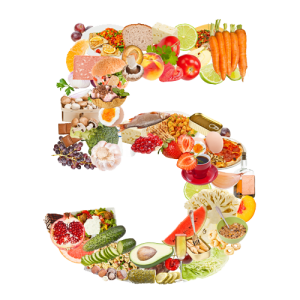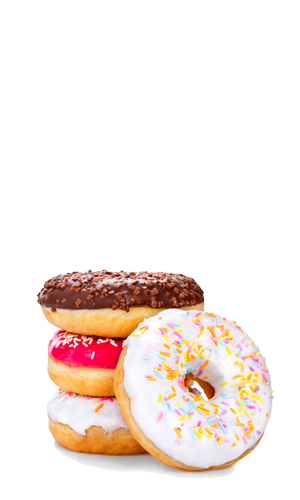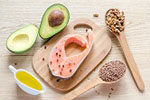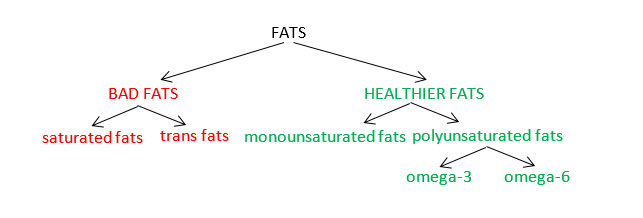Australian Dietary Guidelines
Source: National and Medical Research Council

Enjoy a wide variety of nutritious foods from these five food groups every day:
- Plenty of vegetables of different types and colours, and legumes/beans
- Fruit
- Grain (cereal) foods, mostly wholegrain and/or high cereal fibre varieties, such as breads, cereals, rice, pasta, noodles, polenta, couscous, oats, quinoa and barley
- Lean meats and poultry, fish*1, eggs*2, tofu, nuts and seeds, and legumes/beans
- Milk, yoghurt, cheese and/or their alternatives, mostly reduced fat*3
And drink plenty of water
 Limit intake of foods containing saturated fat, added salt and added sugars.
Limit intake of foods containing saturated fat, added salt and added sugars.
a. Limit intake of foods high in saturated fat such as many biscuits, cakes, pastries, pies, processed meats, commercial burgers, pizza, fried foods, potato chips, crisps and other savoury snacks.
Replace high fat foods which contain predominately saturated fats such as butter, cream, cooking margarine, coconut and palm oil with foods which contain predominately polyunsaturated and monounsaturated fats such as oils, spreads, nut butters/pastes and avocado.
N.B. Low fat diets are not suitable for children under the age of 2 years.
b. Limit intake of foods and drinks containing added salt.
Read labels to choose lower sodium options among similar foods.
See How to read a food label.
Do not add salt to foods in cooking or at the table.
c. Limit intake of foods and drinks containing added sugars such as confectionary, sugar-sweetened soft drinks and cordials, fruit drinks, vitamin waters, energy and sports drinks.
Additional recommendations for people with FH
Additional to the Australian Dietary Guidelines it is recommended that people with FH:
- *¹ eat oily fish at least twice a week e.g. Atlantic salmon, mackerel, Southern blue fin tuna, trevally and sardine
- *² limit the consumption of eggs to 6 per week
- *³ consume only no/reduced fat dairy and other products when available
- consume plant sterols
- consume psyllium
 Types of fats
Types of fats

It was once thought that eating too many cholesterol containing foods (such as eggs, some shellfish) was the major cause of high LDL cholesterol. It has since been proved that eating too much saturated and trans fats has a much greater effect on blood LDL cholesterol levels than does cholesterol consumed in food.
| Cardiovascular effects | Found in | The Heart Foundation recommends | |
| saturated |
|
|
reducing saturated fat to less than 7% of total energy intake (<17 g/day*) |
| trans |
|
|
reducing trans fat to less than 1% of total energy intake (<2 g/day*) |
| cholesterol |
|
|
<300 mg/day |
| monounsaturated |
|
|
|
| omega-3 polyunsaturated |
Marine sources of omega-3 have been shown to reduce the risk of sudden death from heart attack. |
Marine sources:
Plant sources:
|
increasing omega-3 polyunsaturated fat Marine source: increase to 500 mg/day Plant source: increase to |
| omega-6 polyunsaturated |
|
|
keeping omega-6 polyunsaturated fat to 8 – 10% of total energy intake (18 – 23 g/d*) |
*It is recommended that Australian adults have a TOTAL fat intake between 20% and 35% of their energy intake. Therefore, the average person should consume between 47 grams and 82 grams of TOTAL fat per day.
This is based on the average person’s energy requirement of 8,700 kJ per day. (This is the number quoted by fast food outlets!) Your energy requirements may be more or less depending on your age, gender, height, weight and activity level.
 How to eat more of the ‘healthier’ fats and less of the’ bad’ fats
How to eat more of the ‘healthier’ fats and less of the’ bad’ fats
See How to read a food label and Wallet card shopping guide for purchasing guidelines.
N.B. Low fat diets are not suitable for children under the age of 2 years.
- Use no/reduced fat dairy products (milk, cheese, yoghurt). Opt for cheeses that are lower in saturated fat, such as cottage cheese, ricotta and reduced fat cheddar. Choose products with added sterols.
- Use spreads and margarines made from canola, sunflower or olive oil instead of butter.
- Avoid deep fried foods or roasting in oil. For examples of saturated fats to avoid see How to read a food label -> Ingredients -> other words for fat.
- Instead, sauté, stir-fry, grill, bake, steam, boil, microwave, poach or barbeque. Cook with polyunsaturated or monounsaturated oils, such as canola, sunflower, safflower, soy, olive, sesame, peanut and other nut oils instead of oils high in saturated fat.
- Select lean meat and poultry. Trim all visible fat and remove the skin from chicken before cooking.
- Limit processed meat e.g. sausages, bacon, salami etc. swap for 97% fat free ham.
- Eat fish (at least twice a week) and legumes/beans more often.
- Extend meat dishes with legumes/beans and vegetables.
- Choose packaged foods which state they are low/reduced in fat e.g. 97% fat free. But be aware that these may contain more added sugars than regular varieties of the same food.
- Swap sweet products for raisin toast, fruit or nuts.
- Choose tomato based dishes instead of dishes with creamy sauces or fatty gravy.
- Replace sour/cream or coconut cream/milk with light evaporated milk or plain yoghurt.
- When eating out, choose healthier options e.g. bread based takeaways (sandwiches, rolls, wraps), sushi or tomato based dishes, rather than commercially baked or fried foods like pies, sausage rolls, chips, fried/battered chicken/fish/seafood. Order a side salad or vegetables, instead of hot chips.
- Try to limit deep fried foods, fatty takeaway foods and treats to no more than once a week.
Where to get help
The advice in this website does not replace advice from your GP or healthcare provider.
